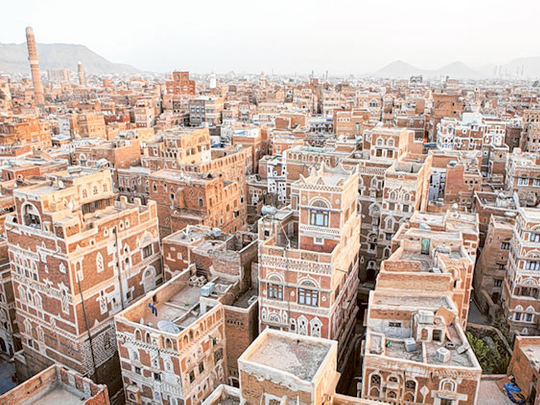
It seems that Yemen and the United Nations Educational, Scientific and Cultural Organisation (Unesco) are engaged nowadays in a clandestine war. Unesco seems to be adopting a method of threatening to deprive Yemen from aid, while Yemen is trying to convince Unesco that aid is compulsory for dealing with countries that are suffering from extraordinary circumstances.
It seems that Unesco, a ‘humanitarian’ organisation, only uses such methods with poor countries, but not countries with political and economic weight. Perhaps the way in which the Unesco was set up is hardly remembered by anyone today.
In 1942, during Second World War, European governments called for a meeting in England to discuss the future of education. Despite the fact that the war was far from over, these countries spoke about ways to rebuild the education system once security and stability were regained.
This plan or project took on a global dimension and drove some governments, including the US to partake in it. On the first week of November 1945, the war came to an end and a UN conference was held for setting up an organisation to deal with education and cultural matters. And thus, Unesco was founded to achieve “intellectual and moral solidarity of mankind” and to ensure that another world war does not occur.
To what extent has this ‘ethical’ organisation strayed from its goals, we do not really know. However, looking back at modern history and its wars in addition to the way the organisation deals with countries, one can discover an important aspect of the answer to that question.
It seems that Unesco’s threat to remove the Old City of Sana’a, dating back to 2,500 years, and the Historic Town of Zabid from its list of World Heritage Sites is a catastrophe for Yemen and its global reputation as a locale for historical sites. These two locations are now considered to be the property of the entire human race and not just that of Yemen because they represent a vital phase of human civilisation. By Yemeni officials’ admission, it is through exceptionally bad circumstances that Yemen has reached this unfortunate fate. Unesco, on the other hand, was never really acquainted with the wisdom of Yemenis or has never really bothered to acknowledge the unfortunate circumstances occurring in the country. This was once a nation that spread happiness to the world and it was dubbed “Happy Yemen”.
The fear is that Unesco, in this day and age, fails to realise that poverty is worsening in the Arab world, while rich countries are intentionally ignoring the existence of this issue, especially its occurrence in Yemen.
Readers are perhaps assuming that Unesco pays huge sums of money to “lucky” countries whose archaeological sites are placed in the organisation’s list of World Heritage Sites and that this money paid by Unesco revitalises and enhances the economic and cultural status of these countries’ peoples and secures a guarantee that this cultural legacy or intangible heritage would be respected. However, this is far from the truth.
Unesco, an organisation with humanitarian efforts that must be both recognised and respected is kept alive and operational through aid provided by UN members. Employees working at the Unesco headquarters or its employees sent to other countries around the world for educational, technical and cultural consultations have their salaries paid to them by their home countries or the nation hosting these consultants. It is worth noting that Unesco’s budget comes to $19-20 million (Dh69.88-73.56 million).
For the sake of clarity, let us review some forms of the financial assistance provided by Unesco, which are labelled as “support for local and regional projects in the fields of culture, development and education”. When an adviser from Unesco is delegated to work in another country, especially an Arab country, his or her monthly salary is paid by the host country. The country also pays for the advisor’s car, their children’s education fees and rental fees of the advisor’s office and furnished house.
Unesco’s participation programme is an integral part of its budget. The organisation’s budget for 2010-2011 was set at $19 million. The organisation decided in its 35th general session held in October 2009 that aid provided for every request submitted for 2010-2011 cannot exceed a certain amount. The following limits were set: $26,000 for national projects, $35,000 for semi-regional projects and $46,000 for regional projects. In addition, it was decided that the participation programme would not spend more than 7 per cent of the budget for emergency aid, not more than 5 per cent for non-governmental international organisations and a limit of 3 per cent for regional activities.
Let us examine a deal struck between Unesco and Arab countries, which it perhaps also struck with other countries around the world. A deal between Unesco and Qatar states that the Qatari government must provide the Unesco office in Qatar with the following facilities: A suitable building for the office, furniture and all necessary office equipment, a furnished apartment for the regional representative (office director) and maintenance and renovation works for the office.
The Qatari government also provides the office with an annual ‘contribution’ of $225,000 , which is spent by the office on salaries, rental fees, services, facilities and the office activities. This paints a clearer picture about the organisation.
Despite the fact that we respect Unesco’s efforts, its importance to cultural development, noble goals and the philosophy behind its operations, one cannot agree with the rhetoric of threats used by the organisation on countries that are facing exceptional circumstances that are way beyond their control, such as Yemen. Perhaps Yemen has committed some errors towards the aforementioned relics. However, Unesco has to adopt a different approach than that of the use of menacing language, which contradicts the goals behind its establishment. Unesco was set up to stand by peace, against war, but its vicious rhetoric and the use of intimidation are synonymous with clashes.
Mohammad Hassan Al Harbi is a writer and journalist.








